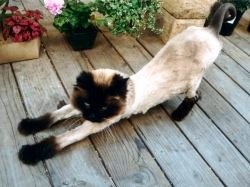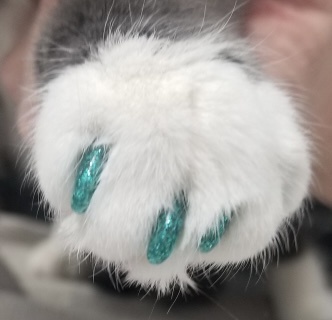Veterinary Services
Health Examinations
Health examinations are critical to ensuring that your cat will lead a long, quality life. Exams alert you to hidden medical conditions such as heart disease and dental problems. All healthy cats between the ages of 1 and 7 years of age should have an annual health examination. After 7 years, or earlier if your cat has been diagnosed with significant medical problems, they should be examined by a doctor at least every 6 months. Some cats with chronic illness should be examined more frequently.
Our doctor will review your cat's history, discuss any signs of illness, including any behavior changes, and will complete a comprehensive physical examination. After completion of the exam, we may recommend additional procedures, such as blood tests or urinalysis, to answer questions we have about your cat's condition.
Medical Diagnostics
Medical Diagnostics are important. We take a special interest in making sure that each test we order is specifically the best indicated for your cat. Sometimes an in-house test is the ideal approach, and in other cases, sending the labwork to a professional outside lab gives the client the best value for them. We pride ourselves on our skills at providing comprehensive medical diagnostics from routine blood and urine testing to skillful x-ray and ultrasound evaluations.
Surgery & Anesthesia
We perform many general surgeries but commonly consult and refer complicated cases to local ACVS Board-Certified Surgical Specialists. We do not recommend or perform declawing procedures as a treatment for any behavioral issue.
During anesthesia our patients are always monitored by their own surgical nurse and utilizing the latest equipment. We use only Sevoflurane, which is currently thought to be the highest quality and safest inhalant gas anesthetic available today. Every patient is covered with a bair-hugger blanket, which circulates warm air around them and keeps their body temperatures normal. This is a critical issue when dealing with small and sometimes fragile patients. Core body temperature, blood pressure, pulse oximetry, end-tidal CO2 and ECG (electrocardiogram) monitoring are standard operating procedure and are included in the cost of every procedure. The best care is standard and not an option to be chosen!
We pride ourselves in our attention to pain prevention and we employ a comprehensive and multi-modal approach to pain management. This involves pre-emptive analgesia, use of local anesthetics, injectable and transdermal narcotics, cold and heat therapy, and medications aimed at the prevention of maladaptive pain. This continues to be an expanding area in Feline Medicine, and we take it upon ourselves to be current on the best care ideas available.
Throughout the medical professions, doctors are becoming more aware of the role of pain relief in speeding recovery from illness and surgery. At The Cat Doctor we consider pain control a critical part of overall patient comfort. We're aggressive in intervening to prevent and control pain through our choice of anesthetic agents, local pain blocks, and slow-release analgesic patches. We use pain-relief patches for painful conditions such as traumatic injuries, and pancreatic and lower urinary tract diseases. We have seen dramatic responses, with patients resting more comfortably, eating better, and returning to normal health faster.
Download Surgery & Anesthesia Consent Form
Dental Care
We offer a complete line of home dental care products to help you keep your cat's teeth healthy. Our trained staff are happy to demonstrate the use these products.
If dental calculus and gingivitis develop, we'll recommend in-hospital dental cleaning. Because anesthesia is required for dental work, pre-anesthesia blood and urine testing are needed prior to dentistry. We perform ultrasonic dental scaling and a high-speed polishing of your cat's teeth. We then carefully examine and record any areas of concern and take digital dental x-rays as needed to further evaluate the teeth. Sometimes diseased teeth will require further treatment and we have all the needed equipment and training to provide the best care available.
We monitor our patients with state-of-the-art anesthesia monitoring equipment and we provide pain relief medications, antibiotics, and fluid support as needed. See our client education sheet entitled Dental Care for Your Cat for more information.
What about Vaccines?
Vaccinations are actually a very miniscule part of our practice. They can be an essential part of overall preventive health care for cats but we believe that in the past, these well-intended preventatives have been inappropriately over-emphasized. At The Cat Doctor, we like to discus the decision to vaccinate openly with our clients, and make sure that we represent the true risks and benefits as they apply to each individual cat. We do follow the recommendations of the American Association of Feline Practitioners in devising the ideal vaccination protocol for each individual cat, based on its lifestyle, exposure to other cats and animals, age, and it's general health. All cats are required to have a comprehensive doctor's examination prior to vaccination. See our Guide to Preventative Care for a Healthy Cat for more information.
Behavioral Consultation
A common cause of the surrender and euthanasia of pet cats is their inappropriate behavior such as house soiling, destructive scratching, and aggression. We can assist you with your selection of a kitten or cat and help you understand normal feline behavior and husbandry so that many of these problems can be avoided. We advise early intervention if problems arise. Sometimes what appear to be behavior problems are actually medical problems in disguise.
Our approach to feline behavior problems begins with taking a complete behavior history, completing a comprehensive examination of your cat, and doing appropriate diagnostic testing.
You should be aware that we set aside extra time for behavior consultations due to their complex nature and often these appointments are continued in multiple follow-up visits via E-mail or phone calls. We consider it our duty to give ourselves 100% to helping you to find humane, and solid solutions to these sometimes very challenging problems.
Grooming

Your cat will feel light on his feet and much more comfortable after grooming. Our skilled veterinary technicians can comb out minor matting on your cat or create a handsome lion cut. They can trim your cat's nails and can demonstrate the procedure to you. Should your cat not allow grooming awake, our doctors can provide safe sedation to allow grooming.
*For lion cuts, we do require a current exam by our veterinarians and they are only performed on select days during the week.

Additional Grooming Options:
Soft Paws These are little plastic caps that are glued to the toenails to blunt the trauma of scratching. Their effective use requires ongoing trimming of the nails and replacing the caps every 4 to 6 weeks. Soft Paws are effective in a quarter of the cats in which they are used. If your cat’s toenails can be trimmed, give this a try. Meet with our technicians for an initial demonstration and application. Learn to apply them yourself or bring your cat back to The Cat Doctor for future applications. They are available in multiple sizes and a variety of colors.
